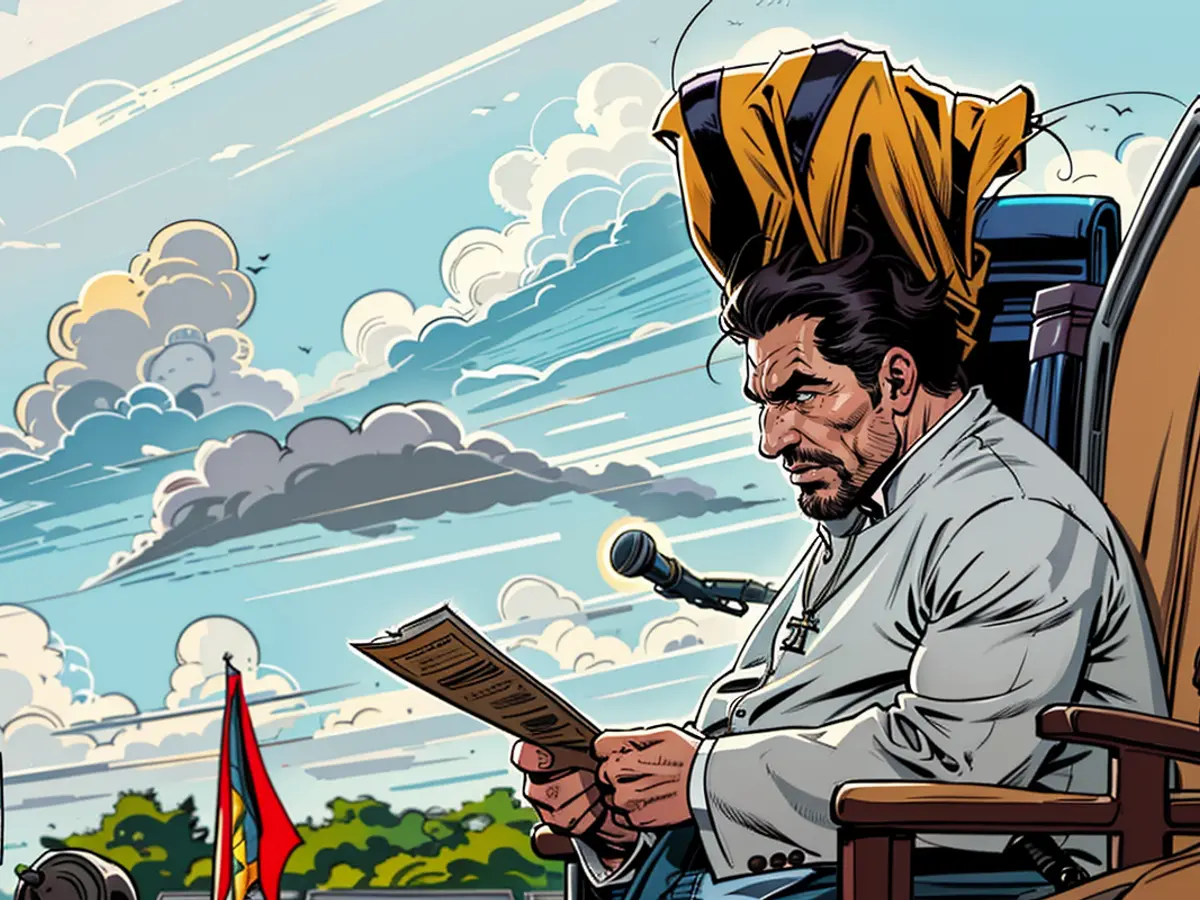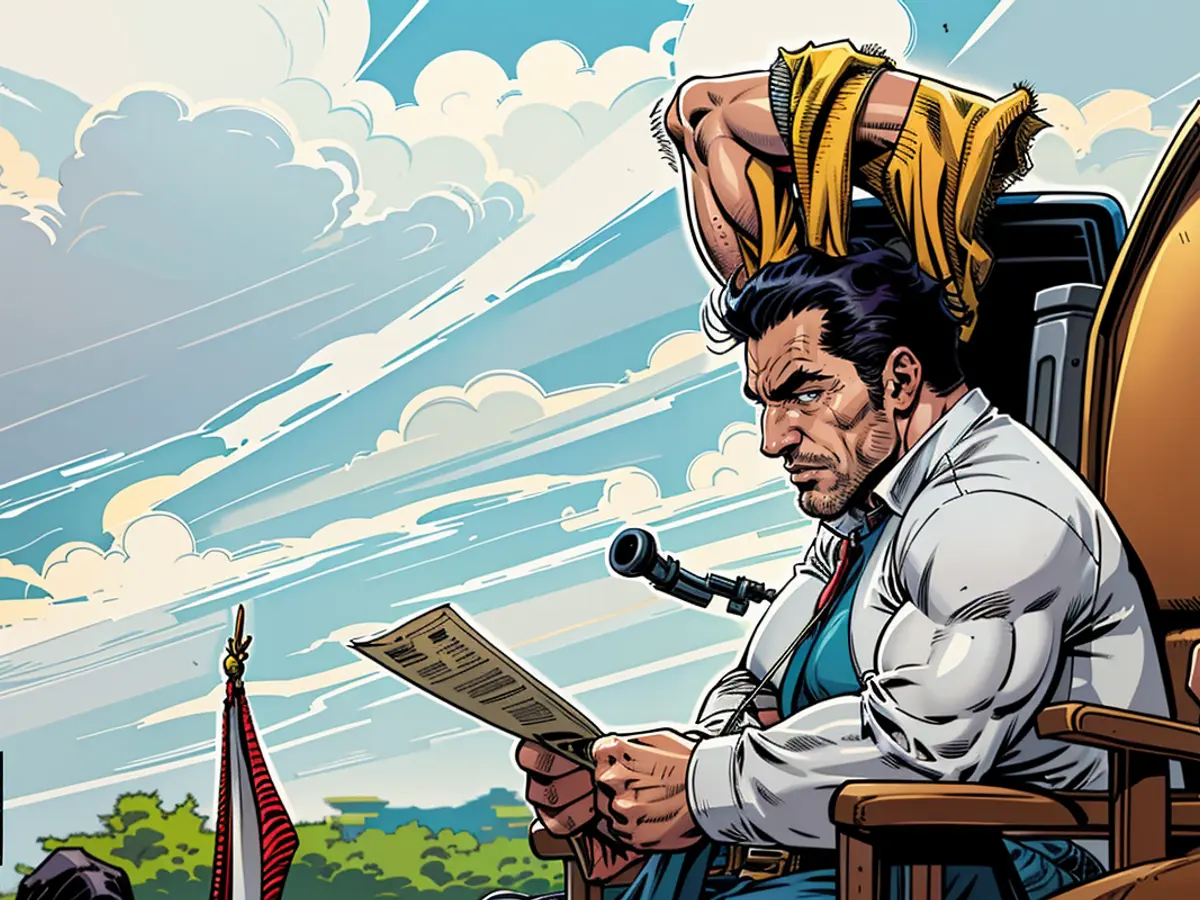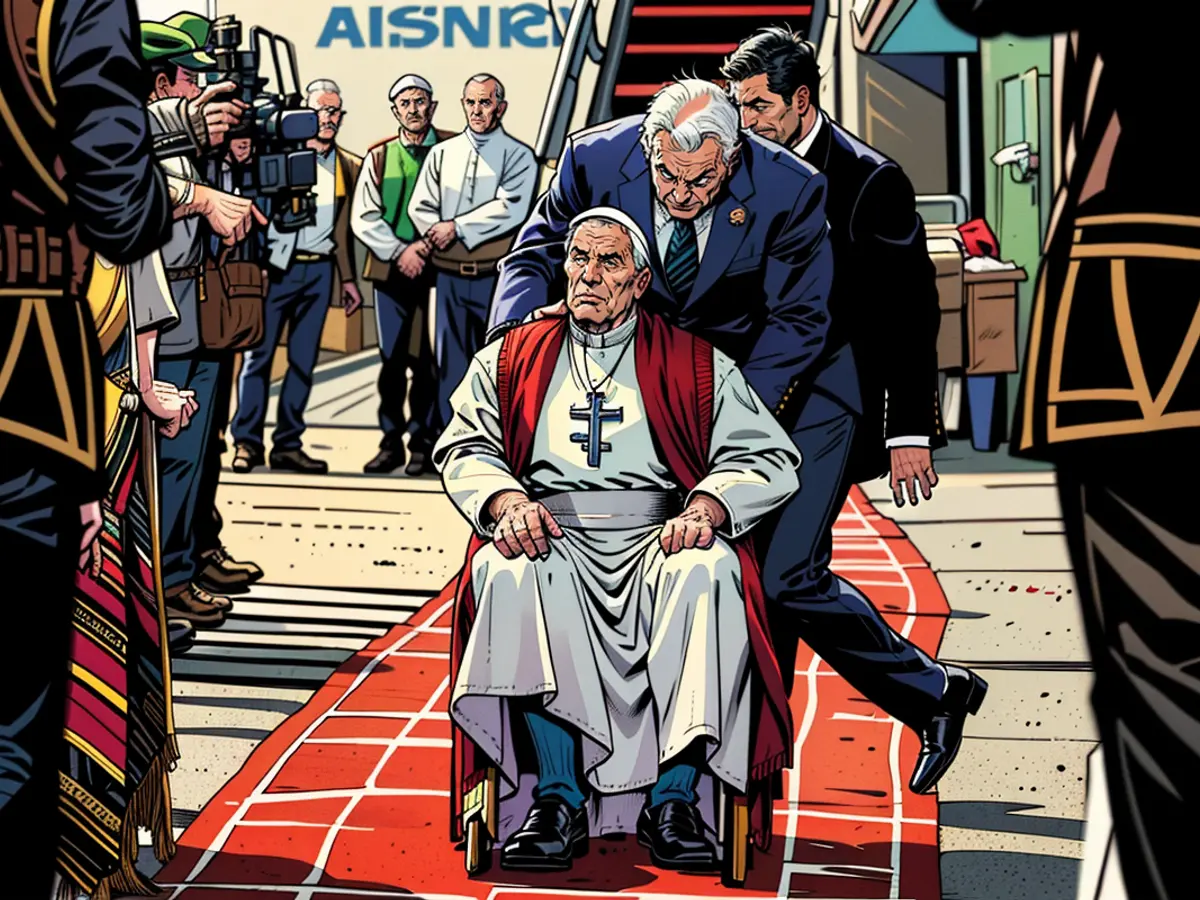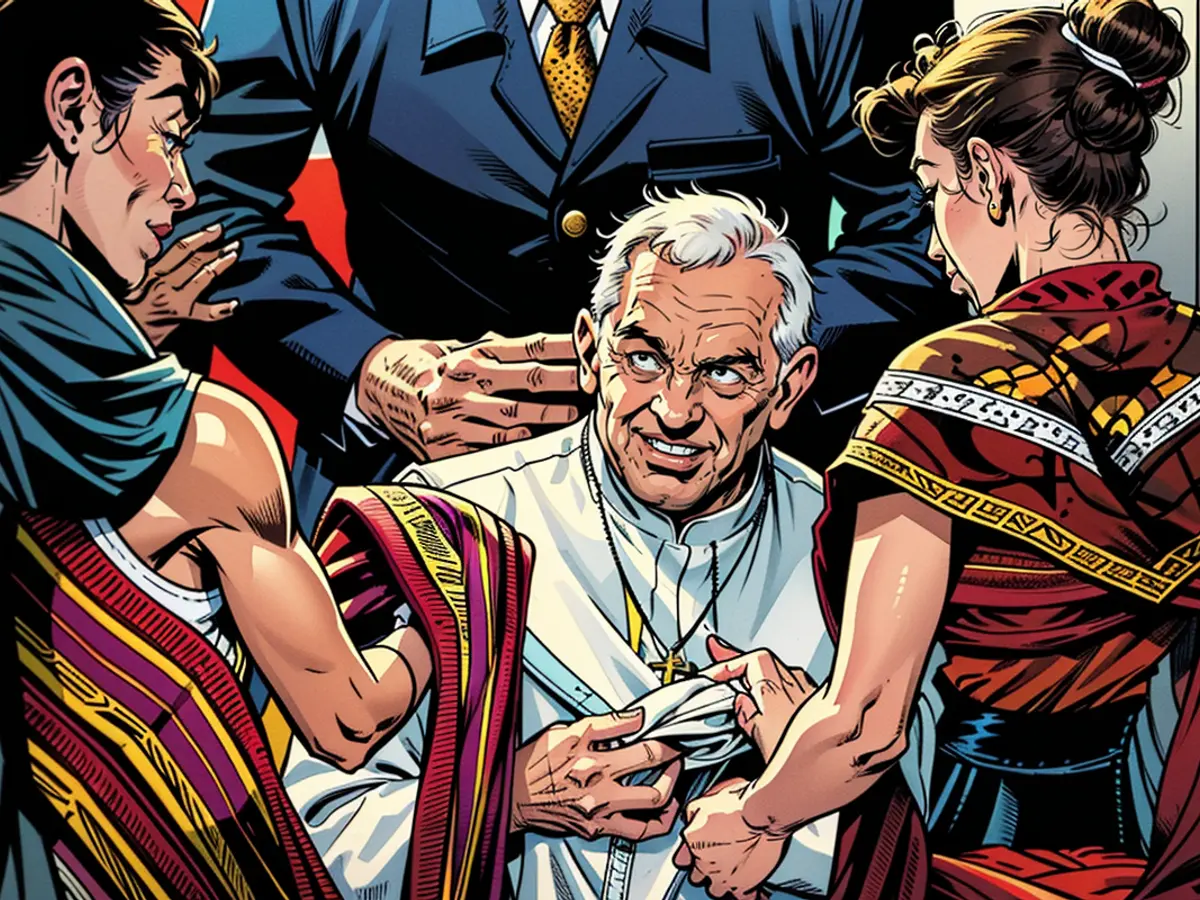Pope Francis touches down in the globe's most devoutly Catholic nation, excluding Vatican City.
Tons of Timorese populace flooded the streets of Dili, the capital, as Francis' popemobile navigated the jam-packed streets, greeted by thrilled crowds waving flags. Francis is scheduled to lead an open-air Mass, with officials anticipating a turnout of approximately 750,000 individuals, surpassing half the country's population.
However, the issue of clerical sexual misconduct overshadows this part of the pope's trip to the region, as instances of mistreatment involving high-profile East Timorese clergy have surfaced in recent years.
During his address to the country's political leaders, the pope encouraged them to combat "all forms of abuse" in order to ensure a "secure and peaceful childhood for every young person."
East Timor, also known as Timor Leste, is recognized as one of the world's youngest nations and possesses a strong affiliation with the Catholic Church, which played a significant role in its turbulent struggle for independence from Indonesia.
This tiny nation, home to just 1.3 million people, is the second-most Catholic country globally, with 97% of the population identifying as Catholic, the highest share outside of the Vatican.
The government of East Timor set aside an astounding $12 million for Francis' inaugural trip to the deeply devoted nation, a sum that has drawn criticism due to the country's modest economy and status as one of Asia's poorest nations.
The pope's visit has reignited scrutiny of the sexual abuse scandal within the church and raised questions about whether Francis will directly address the issue while he's in East Timor, as he has in other countries.
Two years ago, the Vatican acknowledged that it had secretly disciplined East Timorese Bishop and Nobel Peace Prize laureate Carlos Ximenes Belo, following accusations of sexual misconduct towards boys decades ago.
In previous international trips, Francis has met with victims of abuse. While the visit to East Timor does not include Belo on the official agenda, some analysts speculate that if Francis addresses the issue publicly, it would send a strong message to survivors and those who have yet to speak out, whether in the nation or across the region.
An Asian Stronghold of Catholicism
Pope Francis' 12-day tour of Asia includes stops in Indonesia, Papua New Guinea, East Timor, and Singapore, highlighting a significant shift within the Catholic Church as it shifts its focus to Asia.

Francis is the second pope to visit East Timor, following Pope John Paul II in 1989, but this is the first papal visit there since East Timor gained its independence in 2002. The trip comes less than a week after East Timor celebrated the 25th anniversary of its vote for independence from Indonesia.
Located between northwestern Australia and Indonesia, East Timor occupies half of the island of Timor and was utilized as a trading post for sandalwood by the Portuguese since the 17th century.
Four centuries of Portuguese colonial rule resulted in the widespread propagation of Catholicism in East Timor and the development of cultural disparities between the predominantly Muslim-majority Indonesia.
Currently, East Timor's economy is heavily reliant on its oil and gas reserves and continues to grapple with high levels of poverty following decades of conflict.
Christina Kheng, a theologian who teaches at the East Asian Pastoral Institute, told CNN that the young nation "is still grappling with post-war unity and nation-building."
Like other nations in the region, East Timor finds itself caught in the tussle between the United States and China's pursuit of influence in Asia, with US ally Australia at the forefront in providing assistance.
East Timor is also on its way towards becoming the 11th member of the Southeast Asian bloc ASEAN, which could be achieved next year.
Bishop Belo and Sex Abuse Allegations
Bishop Belo, a prominent figure in East Timor's pro-democracy movement during Indonesia's occupation, served as the head of the Catholic Church in East Timor and was awarded the Nobel Peace Prize alongside President Jose Ramos-Horta in 1996 for their efforts in achieving a peaceful resolution to the conflict.
In 2022, the Vatican confirmed that it had imposed sanctions on Belo two years prior, following accusations from two men who claimed that the bishop had sexually abused them when they were teenagers and paid them to maintain their silence.

The Vatican stated that Belo, who is believed to be residing in Portugal, was subjected to travel restrictions, as well as a prohibition on voluntary contact with minors, interviews, and contacts with East Timor.
Although the allegations against Belo stem from the 1980s, the Vatican claimed that it first became involved in the case in 2019.
CNN has requested information from the Vatican regarding whether the case of Bishop Belo will be addressed during the Pope's trip.
Dutch newspaper De Groene Amsterdammer reported on the allegations, claiming that other boys were also allegedly victimized by Belo's abuse dating back to the 1980s.
Belo has never been officially charged in East Timor and has never publicly addressed the accusations.
In a separate case, a court in East Timor sentenced defrocked American priest Richard Daschbach to 12 years in prison for sexually abusing young, vulnerable girls in his care in 2021.
Daschbach, a missionary who ran a shelter for orphaned children in a remote area of the country, admitted to his wrongdoings in 2018. The Vatican expelled him from the church following his confession.
This marked the first time that allegations of sexual abuse committed by a priest had gone to trial in East Timor.
Many abuse victims in East Timor have been hesitant to come forward due to the church's close ties to the independence struggle and the government's treatment of those who have been convicted.
Since Pope Francis became the leader of the world's 1.2 billion Catholics in 2013, numerous reports detailing decades of sexual abuse, systemic failures, and cover-ups across multiple countries have surfaced.

Despite facing criticism for his actions, such as when he defended a Chilean bishop accused of concealing a sexual scandal in 2018, which he later deemed a "major mistake," this individual has taken a strong stance on various matters and initiated reforms. These include measures to hold lay leaders of Vatican-endorsed associations accountable for hiding instances of sexual misconduct.
The Church and East Timor's Struggle for Independence
As civil conflict raged, East Timor was incorporated into Indonesia in 1976 and upgraded to its 27th province following Portugal's democratization and its decision to relinquish its colonies in the same year.
Between 1975 and 1999, more than 200,000 people – approximately a quarter of the population – perished due to violence, massacres, or famine as Indonesia attempted to forcefully establish control.
Indonesia was criticized globally for its suppression, including in 1991 when troops slaughtered young independence advocates at the Santa Cruz cemetery in East Timor's capital, Dili. The imprisonment of Timorese rebel leader and current Prime Minister Xanana Gusmao the following year intensified opposition to Indonesian rule.
It was Suharto's resignation in 1998 and subsequent shift in policy towards East Timor that resulted in a UN-organized referendum on East Timor's independence – which received over 78.5% approval in 1999.
Shortly after the vote, pro-Jakarta militias, supported by the Indonesian military, launched a brutal campaign of violence and looting in the capital, targeting churches, priests, and those seeking refuge. The militias aimed to hunt down independence supporters.
East Timor's infrastructure suffered significant damage in the violence, and approximately 200,000 people were forced to flee their homes. An Australian-led international peacekeeping force eventually intervened, and East Timor officially gained independence in 2002.
During the Indonesian occupation, the Catholic Church played a crucial role in protecting people from attacks and advocating for a vote on independence. However, the church's advocacy came at a heavy cost, with its workers and clergy enduring severe bloodshed.
The Catholic Church in East Timor, being one of the strongest in Asia with 97% of the population identifying as Catholic, has a significant history in the region. Pope Francis' visit to the nation, despite facing scrutiny over clerical sexual misconduct, is seen as a significant moment in reaffirming the church's ties with the young nation.
Francis' tour of Asia underscores the Catholic Church's shifting focus towards Asia, with East Timor being just one of the stops on his 12-day journey. As a nation recognized globally for its affiliation with the Catholic Church, East Timor continues to be an influential Asian stronghold for the religion.









